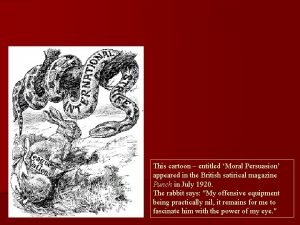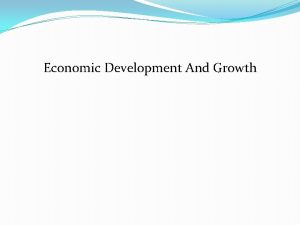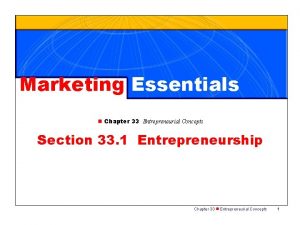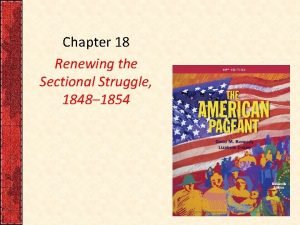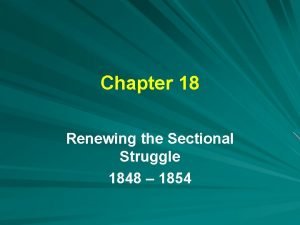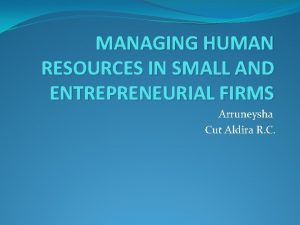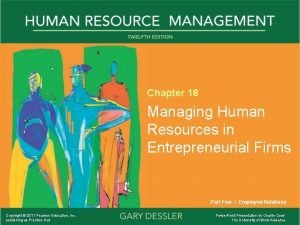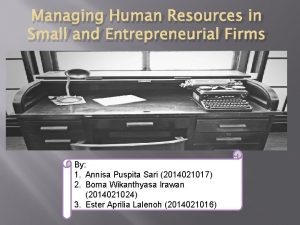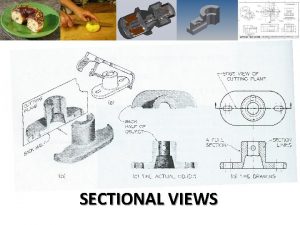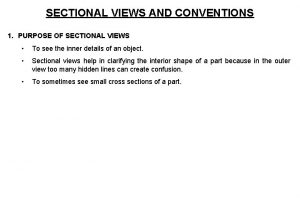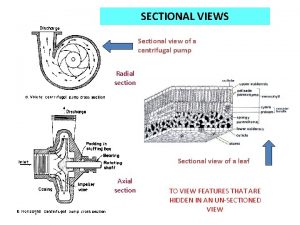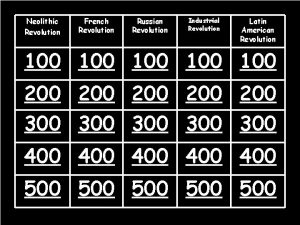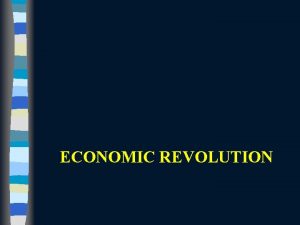Economic Revolution and Sectional Strife Chapter 9 Entrepreneurial























- Slides: 23

Economic Revolution and Sectional Strife Chapter 9

Entrepreneurial Spirit • Factors of Production: • “If movement and the quick succession of sensations and ideas constitute life, here one lives a hundred fold more than elsewhere; here, all is circulation, motion, and boiling agitation. ” economic system in which the means of production are controlled by private individuals/business “Experiment follows experiment; enterprise follows enterprise, riches and poverty follow. ”

Another Revolution Affects America • Manufacturing moved from homes and small workshops to factories – Power-driven machinery – Specialized workers • Industrial Revolution – Social and economic reorganization • Started in Great Britain • – The major change in the US economy produced by people beginning to buy and sell goods rather than make them for themselves

Transportation • Canals – 1816 100 miles of canals – 1831 3, 300+ miles of canals • Railroads – Began replacing canals in 1840 s – 1850 about 10, 000 miles – 1860 about 31, 000 miles

IR in USA • Embargo of 1807 & War of 1812 helped IR start in USA • 1793 established first textile mill in America • 1813 - Francis Cabot Lowell, Nathan Appleton, and Patrick Tracy Jackson opened mills

Early Textile Loom http: //www. b bc. co. uk/bite size/ks 3/hist ory/industrial _era/the_ind ustrial_revol ution/revisio n/9/ http: //www. bbc. co. uk/history/bri tish/victorians/la unch_ani_spinn ing_mill. shtml

The Lowell/Waltham System: First Dual-Purpose Textile Plant Francis Cabot Lowell’s town - 1814

Lowell in 1850

Lowell Mill

Starting for Lowell

Lowell Girls

Lowell Boarding Houses

Average 11 hour work day (12+ hour day) Lowell Mills Time Table

New England Dominance in Textiles

New England Textile Centers: 1830 s

Two Economic Systems Develop • North – Invested more money into manufacturing – Farms were more subsistence than profitdriven • Climate prevented cash-crops from being profitable – Less demand for slavery • South – Growth of cotton + cotton gin = “King Cotton” • Plantation slave system spread and grew

Eli Whitney’s Cotton Gin, 1791

Eli Whitney’s Gun Factory Interchangeable Parts* Rifle

Cumberland (National Road), 1811

Erie Canal System

Robert Fulton & the Steamboat 1807: The Clermont

Principal Canals in 1840

Inland Freight Rates Be careful reading the Y axis!
 What is international strife
What is international strife How evil works
How evil works Prof. meier and baldwin
Prof. meier and baldwin Prologue of romeo and juliet translation
Prologue of romeo and juliet translation Acquit noun
Acquit noun Russian revolution vs french revolution
Russian revolution vs french revolution You should hope this game will be over soon
You should hope this game will be over soon Green revolution vs third agricultural revolution
Green revolution vs third agricultural revolution Chapter 7: pathways to entrepreneurial ventures
Chapter 7: pathways to entrepreneurial ventures Chapter 33 entrepreneurial concepts
Chapter 33 entrepreneurial concepts Short term causes of the french revolution
Short term causes of the french revolution Storming of the bastille cartoon
Storming of the bastille cartoon Could the french revolution have been avoided
Could the french revolution have been avoided Economic growth vs economic development
Economic growth vs economic development Lesson 2 our economic choices
Lesson 2 our economic choices Chapter 18 renewing the sectional struggle
Chapter 18 renewing the sectional struggle Chapter 18 renewing the sectional struggle
Chapter 18 renewing the sectional struggle Managing human resources in small and entrepreneurial firms
Managing human resources in small and entrepreneurial firms Entrepreneurial strategy and competitive dynamics
Entrepreneurial strategy and competitive dynamics Entrepreneurial behaviour and motivation
Entrepreneurial behaviour and motivation Managing human resources in small and entrepreneurial firms
Managing human resources in small and entrepreneurial firms Growing and internationalizing the entrepreneurial firm
Growing and internationalizing the entrepreneurial firm Managing human resources in small and entrepreneurial firms
Managing human resources in small and entrepreneurial firms Entrepreneurial mind frame heart flame and gut game meaning
Entrepreneurial mind frame heart flame and gut game meaning
